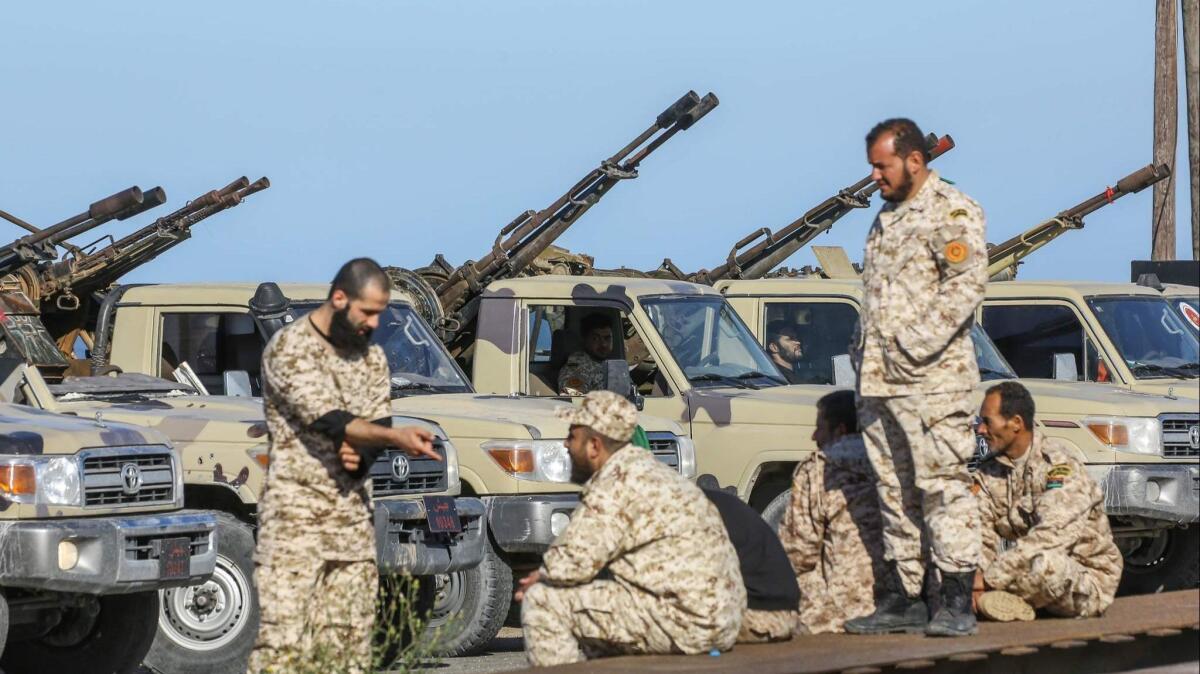U.S. withdraws forces from Libya as fighting escalates

Reporting from Benghazi, Libya — The United States has temporarily withdrawn some of its forces from Libya because of “security conditions on the ground,” a top military official said Sunday as a Libyan commander’s forces advanced toward the capital, Tripoli, and clashed with rival militias.
A small contingent of American troops has been in Libya in recent years, helping local forces combat Islamic State and Al Qaeda militants, as well as protecting diplomatic facilities.
“The security realities on the ground in Libya are growing increasingly complex and unpredictable,” said Marine Corps Gen. Thomas Waldhauser, the head of U.S. Africa Command. “Even with an adjustment of the force, we will continue to remain agile in support of existing U.S. strategy.”
He did not provide details on the number of U.S. troops that had been withdrawn or on how many remained in the country.
Video circulating online showed two apparent U.S. Navy transport craft maneuvering off a beach in Janzour, west of Tripoli, sending up plumes of spray as American forces were ferried from the shore.
India, meanwhile, evacuated a small contingent of peacekeepers. The Indian foreign minister, Sushma Swaraj, said the country’s 15 Central Reserve Police Force peacekeepers were evacuated Saturday from Tripoli because the situation had “suddenly worsened” and fighting had moved into the capital.
The self-styled Libyan National Army, led by Field Marshal Khalifa Haftar, launched a surprise offensive against the capital last week, a move that could potentially drag the country back into civil war. Libya has been gripped by unrest since the 2011 uprising that overthrew and killed longtime dictator Moammar Kadafi. In recent years, the country has been governed by rival authorities in the east and in the west — Tripoli — each backed by various armed groups.
Fayez Serraj, head of government in Tripoli, accused Haftar of “betraying” him.
“We have extended our hands towards peace, but after the aggression that has taken place on the part of forces belonging to Haftar and his declaration of war against our cities and our capital ... he will find nothing but strength and firmness,” Serraj said Saturday in televised comments.
Fighting was underway Sunday at the international airport, about 15 miles from central Tripoli, after Haftar claimed to have seized the area. The airport was destroyed in a previous bout of militia fighting in 2014. Haftar said his forces had launched airstrikes targeting rival militias on the outskirts of Tripoli.
Militias affiliated with a United Nations-backed government in Tripoli said they had also carried out airstrikes, slowing Haftar’s advance.
At least 35 people, including civilians, have been killed on both sides since Thursday.
The Health Ministry of the Tripoli-based government said in a statement that at least 21 people, including a physician, were killed and at least 27 wounded. Ahmed Mesmari, spokesman for Haftar’s forces, said Saturday that 14 troops had been killed since the offensive began.
The fighting has displaced hundreds of people, the U.N. migration agency said. The U.N. mission to Libya called for a two-hour cease-fire on Sunday in parts of Tripoli to evacuate civilians and the wounded.
Haftar’s forces are supported by Egypt, the United Arab Emirates, France and Russia. They answer to the authorities based in eastern Libya, who are at odds with the U.N.-backed government.
More to Read
Sign up for Essential California
The most important California stories and recommendations in your inbox every morning.
You may occasionally receive promotional content from the Los Angeles Times.









